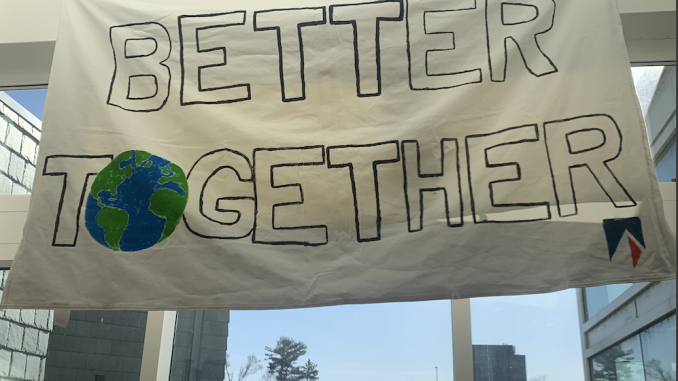
On Feb. 24, a coalition of clubs on campus collaborated to present the Better Together event on the theme of restorative climate justice. Lasting four hours, it featured workshops, dance performances, tabling and keynote speakers.
New York Public Interest Research Group (NYPIRG) and the Environmental Task Force (ETF) were the official hosts for the event, but the Outing Club, Environmental Alliance, The Fahari-Libertad, the Zine Collective, Multicultural United Students Empower (MUSE) and Future Teachers of Color also hosted workshops on a variety of related topics.
Better Together had been a recurring program before the pandemic, so this year NYPIRG and ETF, with the aid of Professor Daniel Lipson from the political science department, wanted to bring it back to build a coalition of student groups around the topic of restorative climate justice. It had been in the works since September.
The event started with an introduction given by Kayla Cleary-Ariza, the public relations and event coordinator for NYPIRG and a member of the ETF. To Cleary-Ariza, restorative climate justice is “bringing awareness to specific communities that have been affected by the impacts of climate change, especially indigenous communities.” Better Together sought to connect students over this theme, so everyone could learn from each other’s experiences no matter where they came from
Cleary-Ariza was followed by Wren Kingsley, Vice President of NYPIRG, who introduced Ulster County Executive Jen Metzger to speak. Metzger highlighted her extensive career at the crossroads of environmentalism and politics, serving as a NYS Senator before being elected into her current office. While serving as senator in 2019, she co-sponsored the Climate Leadership and Community Protection Act, a bill to ambitiously cut emissions in the state. It sets goals of reducing emissions by 85% below 1990 levels by 2050 with the remaining 15% offset by land protections. It also includes special climate justice provisions to protect historically disadvantaged communities. “A really distinguishing feature of our climate law is that it really centers environmental justice.” Metzger further spoke to her current actions as county executive, which seek to “put us on a path to eliminate emissions of greenhouse gas and reduce waste in county government operations and facilities.” This includes promoting renewable energy and public transit.
Metzger was followed by Professor Brian Obach from the sociology department, who emphasized the importance of real social change in the climate movement. “The key is to change the structures that will enable us all to dramatically reduce our ecological footprints. Not through individual acts of virtue, but by reforming the structures that actually shape our behavior and everyone else’s behavior. That structural change is not accomplished through individual consumption.” He took note of the action taken on campus in the past to pressure administration to create the office of sustainability, introduce geothermal heating systems and bring reusable containers to dining locations. This is the kind of action, according to Obach, that is needed to mobilize for change.
Following the speeches, four workshops were held by different clubs with a dance performance from Nova Dance Crew during the lunch break.
Future Teachers of Color hosted a discussion on “Mapping Equity in our Environment.” E-board members spoke about their own experiences with pollution where they’re from and the need for better climate education. Speaking with a slideshow, the presentation flowed into a natural conversation which included all audience members sharing their thoughts. They advocated for a focus on empathy in education beyond the elementary level to lead kids in interactions with others and the environment, as well as the importance of continued climate education into adulthood.
MUSE hosted a “Global Inequalities Seminar.” E-board members presented on economic, social and health issues related to climate change. They highlighted the important role of the U.S. and other wealthy countries in enacting response efforts for those more affected by climate crises, which tend to occur most severely near the equator. This is important due to the negative health effects being wrought and the displacement of people as climate refugees, many of whom from Central America migrate to the US. They focus on the disparities between countries and regions in how they are affected by climate change and what power they have in the international community over it. They also included a very engaging dialogue on how inequalities manifest themselves globally.
The Fahari Libertad and the Zine Collective hosted a zine making workshop. They provided an assortment of magazines and printouts related to the environment for people to cut up and rearrange. Zines, short for magazines, are booklets with images and text made typically for political messaging, but they can truly be about anything. Participants were able to cut, glue and socialize as they worked on their own projects.
The Zine Collective, housed in the library, offered to publish finished submissions.
Lastly, the Outing Club and the New Paltz Environmental Alliance hosted an event of their own. They split people into groups and had them experiment with software on computers showing how different factors impact the increase in global temperatures. They then played an environment themed jeopardy game.
To close out the event, about fifteen clubs participated in a tabling hour where they were able to present their group and talk with each other. Tables included clubs who hosted events that day as well as many others which are not at first thought to be related to climate issues.
Provost William McClure spoke during the tabling about his admiration for on-campus engagement during his first year at New Paltz and the commitment to environmentalism he has found here. “I am really impressed by talking to all of you, the work that you do, the reason you’re doing it and the way that you think about it. All this is really important.”
Kingsley left a final remark. “I hope people feel really inspired to be building bridges with each other and collaborate with one another because of this event.”
Organizers hope this Better Together will inspire future cooperation on campus between various clubs.
